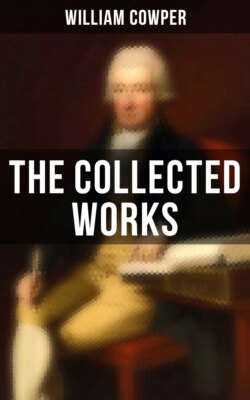Читать книгу The Collected Works - William Cowper - Страница 154
На сайте Литреса книга снята с продажи.
TO MRS. COWPER.
ОглавлениеTable of Contents
Olney, Oct. 19, 1781.
My dear Cousin—Your fear lest I should think you unworthy of my correspondence, on account of your delay to answer, may change sides now, and more properly belongs to me. It is long since I received your last, and yet I believe I can say truly, that not a post has gone by me since the receipt of it that has not reminded me of the debt I owe you for your obliging and unreserved communications both in prose and verse, especially for the latter, because I consider them as marks of your peculiar confidence. The truth is, I have been such a verse-maker myself, and so busy in preparing a volume for the press, which I imagine will make its appearance in the course of the winter, that I hardly had leisure to listen to the calls of any other engagement. It is, however, finished, and gone to the printer's, and I have nothing now to do with it but to correct the sheets as they are sent to me, and consign it over to the judgment of the public. It is a bold undertaking at this time of day, when so many writers of the greatest abilities have gone before, who seem to have anticipated every valuable subject, as well as all the graces of poetical embellishment, to step forth into the world in the character of a bard, especially when it is considered that luxury, idleness, and vice, have debauched the public taste, and that nothing hardly is welcome but childish fiction, or what has, at least, a tendency to excite a laugh. I thought, however, that I had stumbled upon some subjects that had never before been poetically treated, and upon some others to which I imagined it would not be difficult to give an air of novelty by the manner of treating them. My sole drift is to be useful; a point which, however, I knew I should in vain aim at, unless I could be likewise entertaining. I have therefore fixed these two strings upon my bow, and by the help of both have done my best to send the arrow to the mark. My readers will hardly have begun to laugh, before they will be called upon to correct that levity and peruse me with a more serious air. As to the effect I leave it alone in His hands who can alone produce it; neither prose nor verse can reform the manners of a dissolute age, much less can they inspire a sense of religious obligation, unless assisted and made efficacious by the Power who superintends the truth he has vouchsafed to impart.
You made my heart ache with a sympathetic sorrow when you described the state of your mind on occasion of your late visit into Hertfordshire. Had I been previously informed of your journey before you made it, I should have been able to have foretold all your feelings with the most unerring certainty of prediction. You will never cease to feel upon that subject, but, with your principles of resignation and acquiescence in the divine will, you will always feel as becomes a Christian. We are forbidden to murmur, but we are not forbidden to regret; and whom we loved tenderly while living, we may still pursue with an affectionate remembrance, without having any occasion to charge ourselves with rebellion against the sovereignty that appointed a separation. A day is coming when, I am confident, you will see and know that mercy to both parties was the principal agent in a scene, the recollection of which is still painful.
W. C.
Those who read what the poet has here said of his intended publication may perhaps think it strange that it was introduced to the world with a preface, not written by himself but by his friend Mr. Newton. The circumstance arose from two amiable peculiarities in the character of Cowper—his extreme diffidence in regard to himself, and his kind eagerness to gratify the affectionate ambition of a friend whom he tenderly esteemed! Mr. Newton has avowed this feeling in a very ingenuous and candid manner. He seems not to have been insensible to the honour of presenting himself to the public as the bosom friend of that incomparable author whom he had attended so faithfully in sickness and sorrow.
In the course of the following letters, the reader will find occasion to admire the grateful delicacy of the poet, not only towards the writer of his preface, but even in the liberal praise with which he speaks of his publisher.
